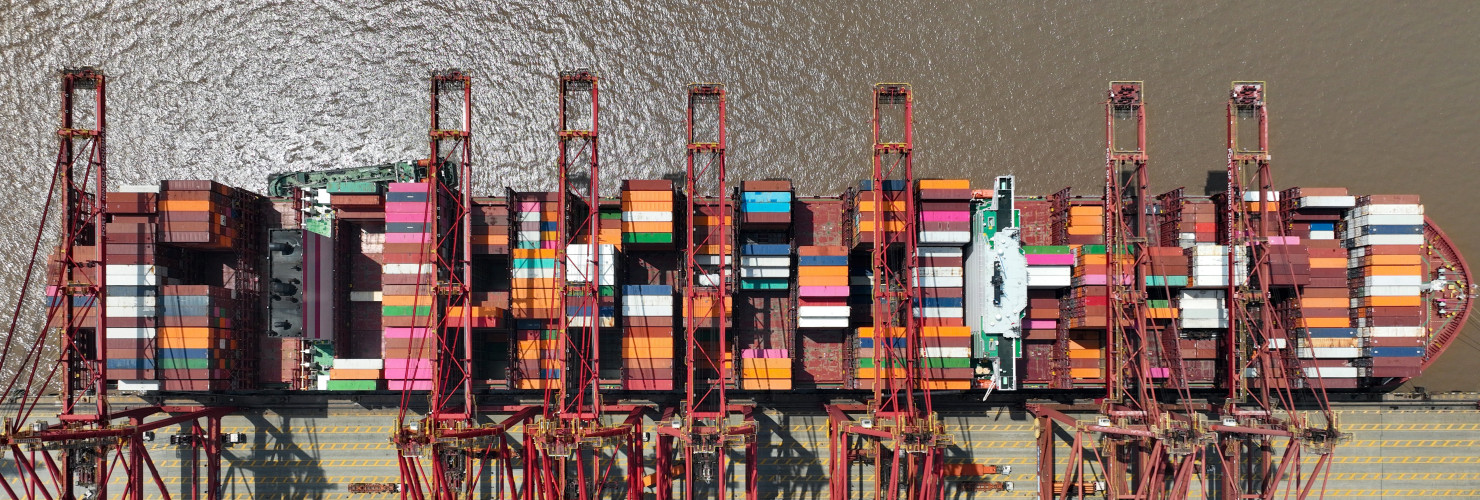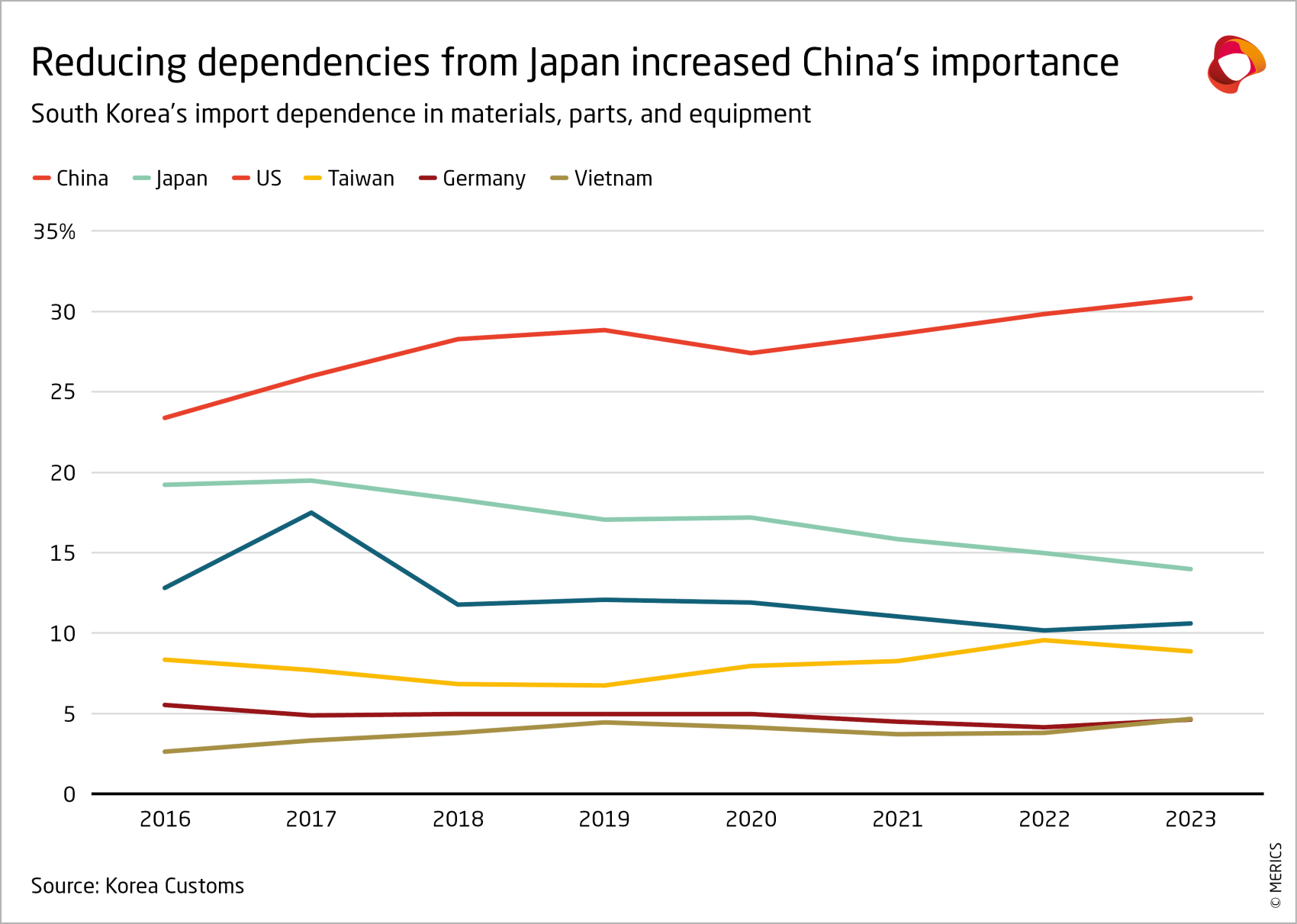

Toward South Korean-German cooperation in economic security
By Seungjoo Lee and Max J. Zenglein
South Korea and Germany face similar challenges from trade protectionism, export controls but also rising Chinese competition in key industries. They should deepen mutual understanding of their respective economic security strategies and share experiences in addressing strategic challenges, say Seungjoo Lee and Max J. Zenglein.
Middle powers such as South Korea and Germany are at risk of becoming victims of great power politics in light of growing US-China frictions. Faced with similar challenges from trade protectionism, export controls but also rising Chinese competition in key industries, identifying commonalities and differences between both countries provides a starting point for analyzing their economic statecraft, while also helping to explore possibilities for bilateral cooperation that leverages their respective industrial strengths.
Manufacturing share to GDP in South Korea and Germany is one of the highest among major industrialized countries, accounting for 25.6 percent and 18.4 percent respectively in 2022. South Korea and Germany’s industrial strength has enabled both countries to continue to occupy vital hub positions in regional value chains in Europe and Asia. Their companies supply other economies with critical inputs such as machinery, chemicals, or electronics and other high value equipment particularly vehicles and transportation equipment.
Striking the balance between security and economic interest is a delicate task
In response to recently unfolding geopolitical risks that are reshaping globalization, governments are scrambling to make appropriate policy adjustments. But implementing these changes is easier said than done as it may raise tensions between governments and companies. Striking the right balance between respective security and economic interest is a delicate task as formulating policy responses may run the risk of over-securitization
In South Korea and Germany, the evolving policy response places high priority on mitigating structural vulnerabilities, especially those related to China. In Germany and Europe, policy responses run under de-risking while in South Korea the approach has shifted to the concept of continuity and change. While the names might be different, the main building blocks share very similar features: reducing dependencies on a single country, enhancing supply chain resilience, and strengthening tech sovereignty.
But there are substantial differences in the details and drivers for the ongoing policy changes. China related vulnerabilities, including the importance of the Chinese market of its companies, are equally seen as risks in both countries. But unlike South Korea Germany has avoided the fate of being directly targeted by Chinese economic coercion. Potentially emerging economic vulnerabilities were only a vague concern until the mid-2010s in the wake of China’s economic coercion against South Korea.
In 2016, the Chinese government responded to South Korea’s decision to deploy Terminal High Altitude Area Defense (THAAD) with de facto economic sanctions affecting a wide range of sectors, including retail, entertainment, tourism, and content services. Even more problematic were the indirect effects of Chinese measures on South Korean companies’ business in China. The automotive, smartphone and display industries, which were not directly targeted by the sanctions, saw their market share in China decline sharply after 2017.
This bitter experience has been a decisive factor in shaping South Korea’s economic statecraft to both reduce overdependence on China but also improve overall resilience. In response, companies and the government are working in sync in South Korea’s national interest aimed at strengthening industrial competitiveness and reduce structural vulnerabilities.
But the issue of economic coercion is not only a factor related to China. For example, in August 2019, tensions with Japan escalated over its occupation period in South Korea. In response South Korea was removed from the whitelist to control the export of key materials essential for semiconductor and display manufacturing again highlighting South Korea’s economic vulnerabilities. Although Japan lifted the export controls in March 2023, the case aroused widespread recognition in South Korea that a strategy focused on strengthening the supply chain resilience of key industries was needed.
Realizing that economic opportunities can be turned to a risk, South Korea needed to achieve a more nuanced approach that balances diversification with self-sufficiency in high technologies. This approach, which can be termed “techno-economic statecraft,” leverages South Korea’s manufacturing prowess in key high-tech industries. High technology becomes a tool for deterring economic coercion and fostering international cooperation.
For instance, in July 2020, the South Korean government implemented the “Materials, Parts, and Equipment Strategy 2.0.” This initiative fosters a collaborative domestic ecosystem, aiming to transform Korean companies into central hubs and vital partners within global supply chains. This enabled South Korea to mitigate structural vulnerabilities in general – not only China related ones, while expanding international cooperation with the United States, Europe, and Southeast Asia.
South Korea managed to limit the impact of economic coercion on its key high-tech industries
South Korea managed to limit the impact of economic coercion on the competitiveness of its key high-tech industries. For example, even though Samsung’s smartphone disintegrated in China, the company maintained or even increased its position in global markets due to its competitiveness and despite trouble in the Chinese market. Rather than getting caught up in excessive fear of economic coercion this example shows it is effective to carry out proactive economic statecraft and international cooperation with like-minded countries.
Both South Korea and Germany are faced with a complex situation requiring policy adjustments to balance economic security and opportunities. Despite the growing risks, it is not desirable to exaggerate the fears as it is likely to lead to costly overreaction. In order to deepen and expand economic security cooperation, South Korea and Germany should start by cultivating mutual understanding of their respective economic security strategies and sharing experiences in addressing strategic challenges.
First, South Korea and Germany should share best practices and lessons learnt in order to maximize the synergies of cooperation based on their complementarities. This initiative would foster the exchange of best practices and insights gleaned from navigating strategic challenges such as the US-China strategic competition, the pandemic outbreak and recent supply chain disruptions affecting shipping.
Second, South Korea and Germany should pursue strategic cooperation that goes beyond individual industries and aligns with their broader national strategies. Both should expand traditional S&T cooperation to high-tech industries such as semiconductors, batteries, automobiles, and AI. For example, South Korean giants such as Samsung Electronics and SK Hynix possess leading AI chip production capabilities, which creates natural synergies for collaboration with German companies.
Third, South Korea and Germany can use bilateral cooperation as a platform to promote regional cooperation between Asia and Europe. The transnational nature of economic security challenges requires a global response. Jointly promoting regional cooperation in Asia can facilitate diversification by coordinating on developing alternative industrial clusters in highly exposed areas which were identified by its companies.
Expanding cooperation with South Korea can help foster policy change in Germany by focusing less on regulation and restrictions on companies as a hallmark of economic security and instead provide new opportunities for companies. There is a realization in Germany that change is needed, but policy implementation is still rather slow and too often driven by fear of Chinese retaliation. De-risking remains mainly a concept that focuses on defensive measures and its effectiveness is restrained by tensions between government and companies.
South Korea with a far larger exposure to the Chinese economy, provides some pragmatic lessons in finding a policy response that is centered around South Korea’s economic competitiveness as a key feature for improved economic security. Stronger South Korean-German cooperation in economic security could help foster stronger competitiveness of its companies and help resist policies that risk over-securitization.
About the authors:
Seungjoo Lee is dean of the College of Social Sciences and Professor of Political Science and International Relations at Chung-Ang University in Seoul.
Max J. Zenglein is chief economist at MERICS.
This article was first published by The Diplomat on April 24, 2024.

